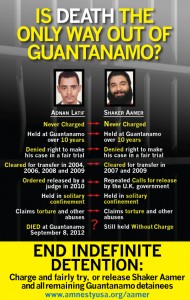
There’s a new crisis unfolding in the Senate right now over the infamous indefinite military detention provisions in the 2012 National Defense Authorization Act (NDAA). I know the effort to fix the NDAA seems to be never-ending, but it is crucial to take action once again, as the Senate is expected to vote tonight or tomorrow. The outcome is critical for human rights.
The problem: A new amendment to the 2013 NDAA offered yesterday by Senator Dianne Feinstein (D-CA) and supported by Senator Rand Paul (R-KY) is being touted in some quarters as sufficient to end concerns about indefinite detention. Unfortunately, that’s not true—and it could make things worse.
Here are 5 reasons Senators Feinstein and Paul should change their amendment to truly support human rights and civil liberties:
1) It’s discriminatory: The Feinstein/Paul amendment clarifies that U.S. citizens and lawful permanent residents (LPR) of the U.S. cannot be held indefinitely without charge or trial. If you’re a U.S. citizen or LPR that may sound good to you. But to anyone who’s not, it’s discriminatory and means the U.S. government will continue to claim that it can hold you forever without charge or trial in the name of unending “global war” (or, for that matter, kill you with a drone).
2) It hurts people who are already being held without charge or fair trial. The amendment implies that the U.S. government’s detention without charge or trial of people right now at Guantanamo and Bagram is fine, including even the 55 Guantanamo detainees who are publicly cleared for transfer out of the prison, but remain held. People like Shaker Aamer, who has been held over 10 years without charge despite the UK government repeatedly calling for his release to London, where his wife and children live.
3) It would violate the U.S. government’s human rights obligations. Under the International Covenant on Civil and Political Rights, as well as other treaties binding on the United States, all people, everywhere, have the right to equal protection under the law, the right to be free from arbitrary detention, and the right to a fair and speedy trial. Congress cannot take those rights away for some people.
4) It raises serious Constitutional concerns. Today, 20 civil liberties and human rights organizations, including Amnesty International, sent this letter to Senator Feinstein, including the point that the 5th Amendment to the Constitution states that “No person shall be…deprived of…liberty…without due process of law.”
5) It will make it harder to truly fix the NDAA. If people think the Feinstein/Paul amendment really fixes the NDAA when in fact it does not, it will make it much harder to mobilize activism in support of truly ending detention without charge. We can’t let that happen. This is a fundamental issue that cuts to the heart of what it means for a country to uphold the rule of law.
The good news is that there is an easy way to fix the Feinstein/ Paul amendment:
“Purpose: To clarify that an authorization to use military force, a declaration of war, or any similar authority shall not authorize the detention without charge or trial of a citizen or lawful permanent resident of the United States anyone, in violation of international law.”
It may be a tough sell in this Congress, but it’s the right thing to do and our elected officials need to hear from us–today.
Take Action
>Call the offices of Senator Feinstein and Senator Paul, and urge them to change their amendment to ensure that no person, anywhere, is held without charge or trial, in violation of international law. Even if you don’t live in their states, this is a matter of national and international importance, so you should feel free to call.
>Email your two Senators, urging them to support a real NDAA fix by repealing the detention provisions, including the restrictions on the transfer of Guantanamo detainees.
>Email President Obama about Shaker Aamer, urging that he be immediately released to the UK unless he is to be charged and fairly tried.
